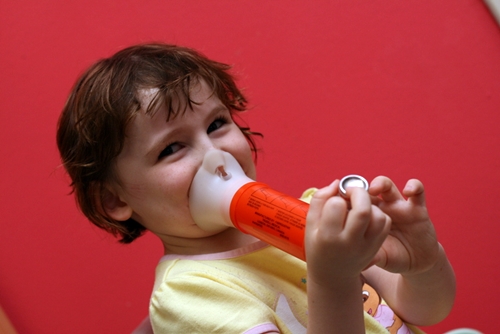4 November 2015. A wearable device that detects conditions triggering asthma attacks in children is being developed by a team of engineers and behavioral scientists. The four-year project brings together sensor designers at University of Maryland-Baltimore County and psychologists at Southern Methodist University in Dallas, funded by a $2 million grant from National Institute of Biomedical Imaging and Bioengineering, part of National Institutes of Health.
Asthma is chronic condition, where the airways become inflamed and narrow, causing people with asthma to experience wheezing, shortness of breath, tightness in the chest, and coughing for periods of time. Centers for Disease Control and Prevention estimates that in 2010 some 18.7 million adults had asthma, along with 7 million children.
This device is being designed for children. It’s expected to have sensors that detect environmental factors, called triggers, causing people with asthma to react, such as pollution, pollen, dust, smoke, and pet hair. In addition, the device will also watch for physiological triggers, including physical activity levels and emotional stress. Some detectors today can identify one or, at most, a few asthma triggers, but no comprehensive device yet exists.
The new system plans to incorporate work on biomedical sensors done by UMBC’s Center for Advanced Sensor Technology that so far developed a portable system, but in this project aims to miniaturize the device further to the size of a pendant that children can wear. The goal of the device is to provide children and their parents more objective data on the conditions that trigger asthma attacks, so they can avoid those situations or take appropriate action before the attacks become too severe.
“The monitoring system will help patients objectively determine when and why they experienced the asthma symptoms,” says Yordon Kostov, assistant director of Center for Advanced Sensor Technology and project leader for UMBC in a university statement.
The project team includes SMU health psychologists Thomas Ritz and Alicia Meuret, since stress can worsen the severity of asthma attacks, particularly in children. Ritz estimates 25 to 30 percent of patients have asthma symptoms triggered by emotional stimuli.
In an SMU statement Meuret notes her earlier work includes “developing a treatment that addresses hyperventilation using portable CO2 measurement devices, and teaching patients who suffer from panic disorders to normalize their CO2 levels and stop hyperventilating.” Team members expect a version of those instructions to be included in the trigger detection device.
Read more:
- Faster Process Devised for Skin-Patch Sensors
- Mobile App Collecting Placenta Health Data
- iPhone App Capturing Hepatitis C Research Data
- Manufacturing Process Devised for Skin-Patch Electronics
- Inside Air Monitor Devised as Smartphone Add-On
* * *


 RSS - Posts
RSS - Posts
[…] Wearable Asthma Trigger Detector in Development […]